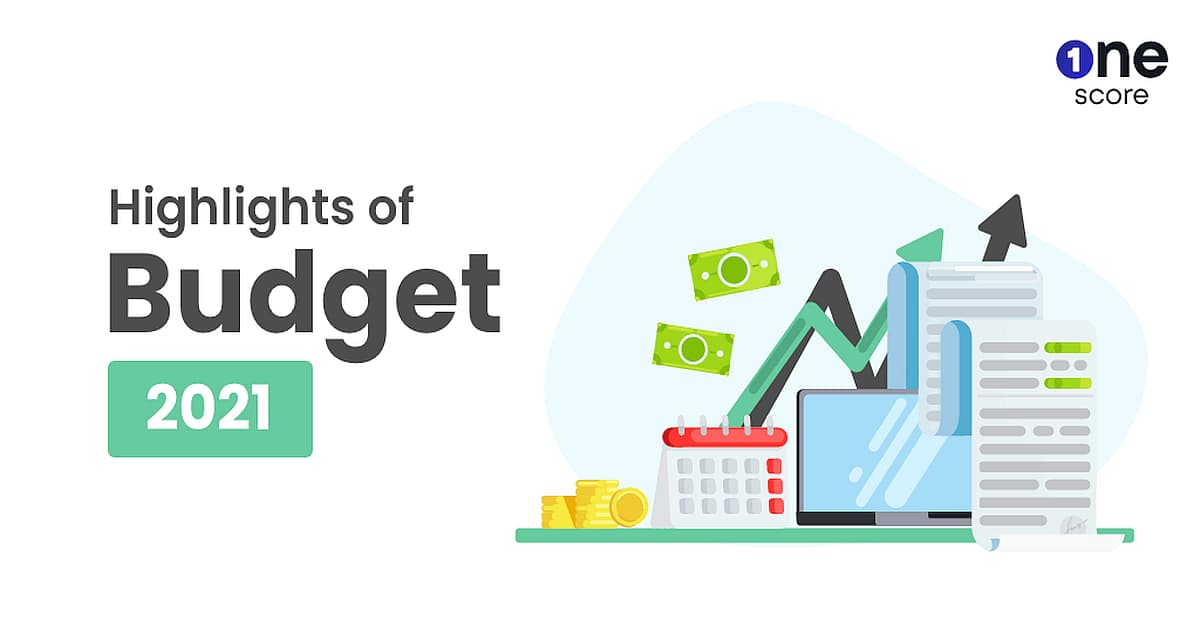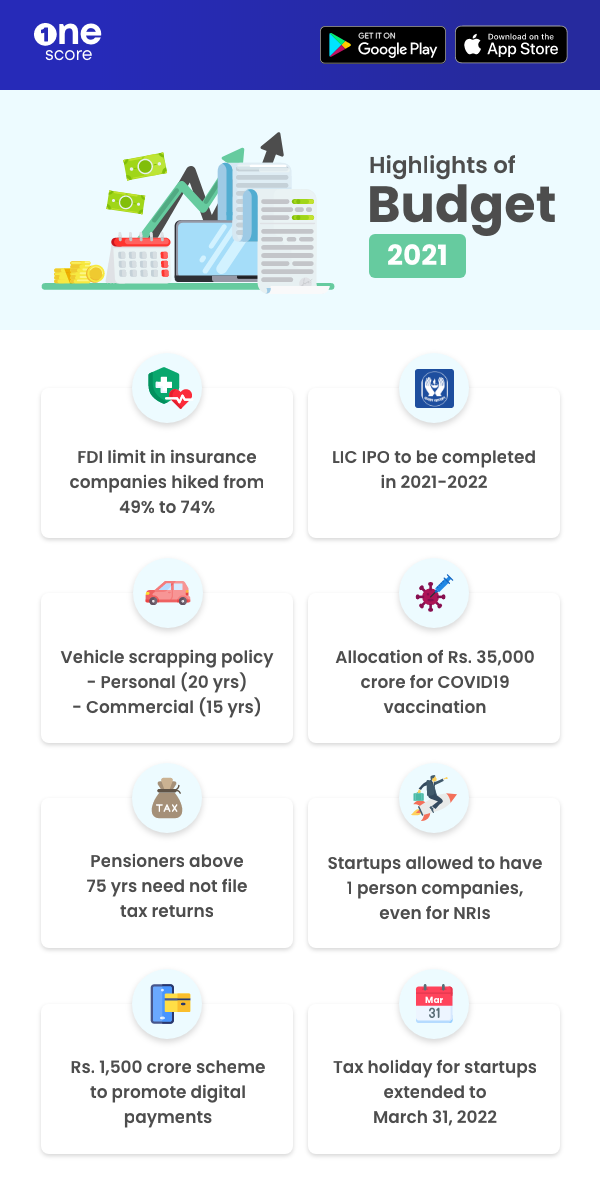Key highlights of Budget 2021 and how they impact you
India's first ever Digital Budget was presented by the Finance Minister on February 01, 2021. Here are the key highlights.

The Union Budget 2021 was presented yesterday, February 01, 2021 by the Finance Minister. It was the first budget of the decade, and also India’s first ever “digital budget”.
Highlights of Budget 2021
The Budget proposals for 2021-2022 rest on 6 pillars:
- Health and Wellbeing
- Physical & Financial Capital, and Infrastructure
- Inclusive Development for Aspirational India
- Reinvigorating Human Capital
- Innovation and R&D
- Minimum Government and Maximum Governance
Health and Wellbeing
- Launch of PM AtmaNirbhar Swasth Bharat Yojana with an outlay of ₹64,180 crore over 6 years
- Launch of Jal Jeevan Mission (Urban) for universal water supply to be implemented over 5 years, with an outlay of ₹2. 87 lakh crore
- Implementation of Urban Swachh Bharat Mission 2.0 with an allocation of ₹1.41 lakh crore over a period of 5 years from 2021-2026
- Voluntary vehicle scrapping policy announced for personal vehicles up to 20 years old, and commercial vehicles that are 15 years old
- Allocation of ₹35,000 crore for COVID-19 vaccination in 2021-22
Physical & Financial Capital, and Infrastructure
- Allocation of ₹1.97 lakh crore, over 5 years starting FY 2021-22 towards PLI schemes for 13 sectors to create manufacturing global champions
- Launch of Mega Investment Textiles Parks (MITRA) to create global champions in exports - 7 Textile Parks will be established over 3 years
- Debt Financing of InVITs and REITs by Foreign Portfolio Investors to be enabled
- Ujjwala Scheme to be extended to cover 1 crore more beneficiaries in addition to existing 8 crore households
- Foreign Direct Investment (FDI) limit in insurance companies increased from 49% to 74%
Inclusive Development for Aspirational India
- SWAMITVA Scheme to be extended from 1.80 lakh property-owners in 1,241 villages to all States and Union Territories
- Investment in the development of modern fishing harbours and fish landing centres, beginning with Kochi, Chennai, Visakhapatnam, Paradip, and Petuaghat
- One Nation One Ration Card scheme currently implemented by 32 states and UTs - remaining 4 states and UTs to be integrated soon
- Gig and platform workers to get social security benefits and minimum wages, and will be covered by the Employees State Insurance Corporation
- Women can work in all categories and in night-shifts, with adequate protection.
Reinvigorating Human Capital
- 100 new Sainik Schools will be set up in partnership with NGOs/private schools/states
- Over 15,000 schools to include all components of the National Education Policy (NEP)
- Proposal to set up Central University in Leh for accessible higher education in Ladakh
- Outlay of ₹3,000 crore towards National Apprenticeship Training Scheme (NATS)
- Partnerships with the United Arab Emirates (UAE) and Japan for skill assessment and deployment of certified workforce
Innovation and R&D
- Outlay of ₹50,000 crore towards the National Research Foundation (NRF)
- Proposal of ₹1,500 crore to provide financial incentive to promote digital modes of payment
- Allocation of ~ ₹4,000 crore over 5 years to launch a Deep Ocean Mission
- 4 Indian astronauts being trained on Generic Space Flight aspects in Russia as part of the Gaganyaan mission. First unmanned launch expected in December 2021
- Launch of National Language Translation Mission (NTLM), a new initiative to enable policy information being made available in major Indian languages
Minimum Government and Maximum Governance
- Allocation of ₹3,768 crore for the upcoming census - the first digital census in the history of India
- Provide ₹1,000 crore for the welfare of Tea workers in Assam and West Bengal
- Proposed grant of ₹300 crore to the Government of Goa towards celebration of diamond jubilee year since liberation from Portuguese rule
- Proposal to augment The Contingency Fund of India from ₹500 crore to ₹30,000 crore
- Proposal to set up a Conciliation Mechanism to facilitate ease of doing business with Government or CPSEs to instill confidence in investors and contractors

Other key highlights and their impact:
Here are the some of the other highlights and takeaways from Budget 2021:
Impact on individuals
- No change in personal income tax slabs
- Details of capital gains, dividend income, interest from banks, post office, etc. will be pre-filled
- Advance tax liability on dividend income to arise only after declaration/payment of dividend
- Proposal to halve time for reopening of income tax assessment cases to 3 years
- Interest on provident fund contributions exceeding ₹2.5 lakh will be taxable from April 2021
- No tax exemption on maturity proceeds for ULIP issued on or after February 1, 2021, with annual premium above ₹2.5 lakh
- Filing of income tax return not required for senior citizens above 75 years of age with income only from pension and interest
- Serious tax offences of concealment of income of over ₹50 lakh can be reopened after 10 years
- Deadline for additional interest deduction Section 80EEA on affordable housing to be extended by a year to March 31, 2022
- Deposit Insurance Cover for bank customers to be increased from ₹1 lakh to ₹5 lakh
- Import duty on gold and silver reduced from 12.5% to 7.5%
- Imported products such as compressors for refrigerators and air conditioners, alcoholic beverages, LED lamps, solar lanterns, mobile phones, and power banks to cost more
Impact on businesses
- LIC of India to be listed on stock exchanges; IPO to be completed in 2021-22
- Tax holidays proposed for aircraft leasing and rental companies
- Employee’s PF contribution deducted but not deposited will not be allowed as a deduction for the employer
- Allow incorporation of One Person Companies (OPCs), by Indians and NRIs (Non Resident Indians)
- Reduce residency limit for an Indian citizen to set up an OPC from 182 days to 120 days
- The eligibility period to claim tax holiday for startups extended to March 31, 2022, in order to incentivise setting up of more start-ups
- The eligibility period of claiming capital gains exemption for investments in startups extended to March 31, 2022
- Proposal to set up a “Bad Bank” to take over and consolidate stressed debt and dispose of assets
- Minimum loan size eligible under SARFAESI Act 2002 for debt recovery for NBFCs with minimum asset size of ₹100 crore to be reduced from ₹50 lakh to ₹20 lakh.
**Disclaimer: The information provided on this webpage does not, and is not intended to, constitute any kind of advice; instead, all the information available here is for general informational purposes only. FPL Consumer Services Private Limited and the author shall not be responsible for any direct/indirect/damages/loss incurred by the reader in making any decision based on the contents and information. Please consult your advisor before making any decision.
- OneScore , February 02, 2021

